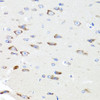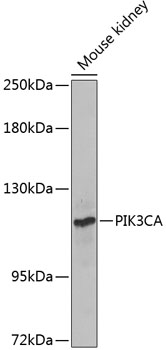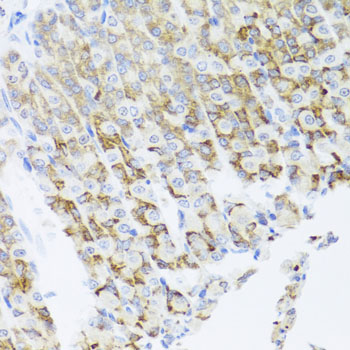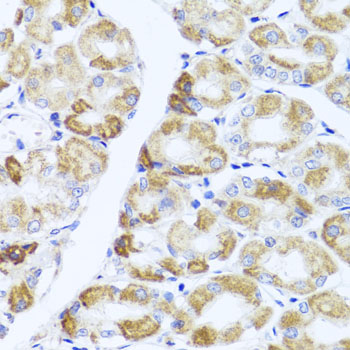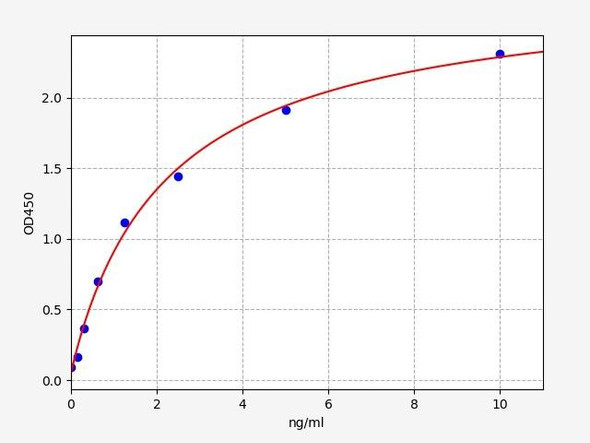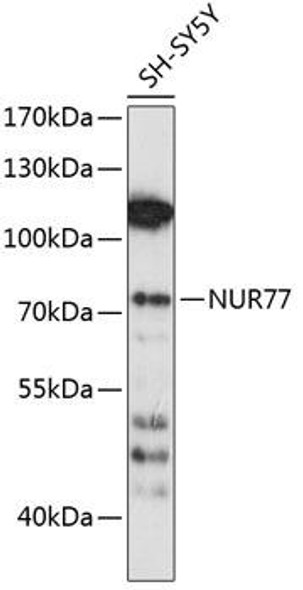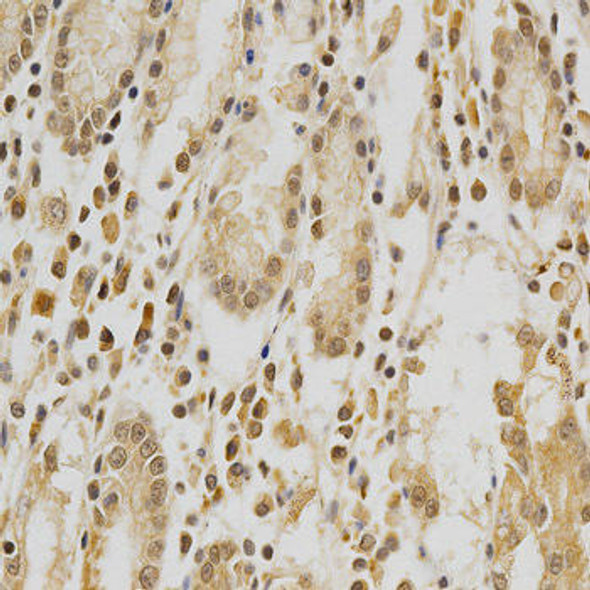Description
Anti-PIK3CA Antibody (CAB12484)
The PIK3CA Polyclonal Antibody (CAB12484) is specially designed for research involving PIK3CA, a gene that encodes the catalytic subunit of phosphoinositide 3-kinase (PI3K). This antibody, produced in rabbits, exhibits high reactivity with human samples and has been validated for use in Western blot applications. It specifically binds to the PIK3CA protein, allowing for accurate detection and analysis in various cell types.PIK3CA is a key player in the PI3K/AKT signaling pathway, which is involved in regulating cell growth, proliferation, and survival.
Mutations in the PIK3CA gene have been implicated in various human cancers, making it a promising target for cancer research. Understanding the function and regulation of PIK3CA is essential for developing targeted therapies for cancer treatment.The PIK3CA Polyclonal Antibody is a valuable tool for researchers studying the role of PIK3CA in cancer biology, as well as in other diseases and conditions where the PI3K/AKT pathway is dysregulated. Its high specificity and sensitivity make it an ideal choice for immunology and oncology research projects.
| Antibody Name: | Anti-PIK3CA Antibody |
| Antibody SKU: | CAB12484 |
| Antibody Size: | 20uL, 50uL, 100uL |
| Application: | WB IHC |
| Reactivity: | Human, Mouse, Rat |
| Host Species: | Rabbit |
| Immunogen: | A synthetic peptide of human PIK3CA |
| Application: | WB IHC |
| Recommended Dilution: | WB 1:500 - 1:2000 IHC 1:50 - 1:200 |
| Reactivity: | Human, Mouse, Rat |
| Positive Samples: | Mouse kidney |
| Immunogen: | A synthetic peptide of human PIK3CA |
| Purification Method: | Affinity purification |
| Storage Buffer: | Store at -20'C. Avoid freeze / thaw cycles. Buffer: PBS with 0.02% sodium azide, 50% glycerol, pH7.3. |
| Isotype: | IgG |
| Sequence: | Email for sequence |
| Gene ID: | 5290 |
| Uniprot: | P42336 |
| Cellular Location: | |
| Calculated MW: | 124kDa |
| Observed MW: | 110kDa |
| Synonyms: | PIK3CA, CLOVE, CWS5, MCAP, MCM, MCMTC, PI3K, PI3K-alpha |
| Background: | Phosphatidylinositol 3-kinase is composed of an 85 kDa regulatory subunit and a 110 kDa catalytic subunit. The protein encoded by this gene represents the catalytic subunit, which uses ATP to phosphorylate PtdIns, PtdIns4P and PtdIns(4, 5)P2. This gene has been found to be oncogenic and has been implicated in cervical cancers. A pseudogene of this gene has been defined on chromosome 22. |
| UniProt Protein Function: | PIK3CA: Phosphoinositide-3-kinase (PI3K) that phosphorylates PtdIns (Phosphatidylinositol), PtdIns4P (Phosphatidylinositol 4- phosphate) and PtdIns(4,5)P2 (Phosphatidylinositol 4,5- bisphosphate) to generate phosphatidylinositol 3,4,5-trisphosphate (PIP3). PIP3 plays a key role by recruiting PH domain-containing proteins to the membrane, including AKT1 and PDPK1, activating signaling cascades involved in cell growth, survival, proliferation, motility and morphology. Participates in cellular signaling in response to various growth factors. Involved in the activation of AKT1 upon stimulation by receptor tyrosine kinases ligands such as EGF, insulin, IGF1, VEGFA and PDGF. Involved in signaling via insulin-receptor substrate (IRS) proteins. Essential in endothelial cell migration during vascular development through VEGFA signaling, possibly by regulating RhoA activity. Required for lymphatic vasculature development, possibly by binding to RAS and by activation by EGF and FGF2, but not by PDGF. Regulates invadopodia formation in breast cancer cells through the PDPK1- AKT1 pathway. Participates in cardiomyogenesis in embryonic stem cells through a AKT1 pathway. Participates in vasculogenesis in embryonic stem cells through PDK1 and protein kinase C pathway. Has also serine-protein kinase activity: phosphorylates PIK3R1 (p85alpha regulatory subunit), EIF4EBP1 and HRAS. Heterodimer of a catalytic subunit PIK3CA and a p85 regulatory subunit (PIK3R1, PIK3R2 or PIK3R3). Interacts with IRS1 in nuclear extracts. Interacts with RUFY3. Interacts with RASD2. Interacts with APPL1. Interacts with HRAS1 and KRAS. Interaction with HRAS1/KRAS is required for PI3K pathway signaling and cell proliferation stimulated by EGF and FGF2. Belongs to the PI3/PI4-kinase family. |
| UniProt Protein Details: | Protein type:Motility/polarity/chemotaxis; Oncoprotein; EC 2.7.11.1; EC 2.7.1.153; Kinase, lipid; Carbohydrate Metabolism - inositol phosphate Chromosomal Location of Human Ortholog: 3q26.3 Cellular Component: lamellipodium; plasma membrane; phosphoinositide 3-kinase complex; cytosol Molecular Function:protein serine/threonine kinase activity; protein binding; phosphatidylinositol-4,5-bisphosphate 3-kinase activity; insulin receptor substrate binding; 1-phosphatidylinositol-3-kinase activity; kinase activity; protein kinase activator activity; ATP binding; phosphatidylinositol-4-phosphate 3-kinase activity; phosphoinositide 3-kinase activity Biological Process: epidermal growth factor receptor signaling pathway; platelet activation; phosphoinositide-mediated signaling; fibroblast growth factor receptor signaling pathway; nerve growth factor receptor signaling pathway; regulation of multicellular organism growth; glucose metabolic process; positive regulation of peptidyl-serine phosphorylation; T cell receptor signaling pathway; protein amino acid phosphorylation; vasculature development; phosphoinositide phosphorylation; positive regulation of protein kinase activity; phospholipid metabolic process; T cell costimulation; phosphatidylinositol biosynthetic process; protein kinase B signaling cascade; insulin receptor signaling pathway; innate immune response; endothelial cell migration; negative regulation of neuron apoptosis; angiogenesis; blood coagulation; vascular endothelial growth factor receptor signaling pathway; leukocyte migration; cardiac muscle contraction Disease: Cowden Syndrome 5; Gastric Cancer; Keratosis, Seborrheic; Breast Cancer; Lung Cancer; Ovarian Cancer; Congenital Lipomatous Overgrowth, Vascular Malformations, And Epidermal Nevi; Colorectal Cancer; Megalencephaly-capillary Malformation-polymicrogyria Syndrome; Hepatocellular Carcinoma; Nevus, Epidermal |
| NCBI Summary: | Phosphatidylinositol 3-kinase is composed of an 85 kDa regulatory subunit and a 110 kDa catalytic subunit. The protein encoded by this gene represents the catalytic subunit, which uses ATP to phosphorylate PtdIns, PtdIns4P and PtdIns(4,5)P2. This gene has been found to be oncogenic and has been implicated in cervical cancers. A pseudogene of this gene has been defined on chromosome 22. [provided by RefSeq, Apr 2016] |
| UniProt Code: | P42336 |
| NCBI GenInfo Identifier: | 126302584 |
| NCBI Gene ID: | 5290 |
| NCBI Accession: | P42336.2 |
| UniProt Related Accession: | P42336 |
| Molecular Weight: | ~ 110kDa |
| NCBI Full Name: | Phosphatidylinositol 4,5-bisphosphate 3-kinase catalytic subunit alpha isoform |
| NCBI Synonym Full Names: | phosphatidylinositol-4,5-bisphosphate 3-kinase catalytic subunit alpha |
| NCBI Official Symbol: | PIK3CA |
| NCBI Official Synonym Symbols: | MCM; CWS5; MCAP; PI3K; CLAPO; CLOVE; MCMTC; PI3K-alpha; p110-alpha |
| NCBI Protein Information: | phosphatidylinositol 4,5-bisphosphate 3-kinase catalytic subunit alpha isoform |
| UniProt Protein Name: | Phosphatidylinositol 4,5-bisphosphate 3-kinase catalytic subunit alpha isoform |
| UniProt Synonym Protein Names: | Phosphatidylinositol 4,5-bisphosphate 3-kinase 110 kDa catalytic subunit alpha; PtdIns-3-kinase subunit p110-alpha; p110alpha; Phosphoinositide-3-kinase catalytic alpha polypeptide; Serine/threonine protein kinase PIK3CA (EC:2.7.11.1) |
| UniProt Gene Name: | PIK3CA |
| UniProt Entry Name: | PK3CA_HUMAN |







